#Schumann’s Symphony No. 4
Explore tagged Tumblr posts
Text
it's possible I made an extended playlist to give context to the classical (non-technically speaking) music in OFMD, with the pieces listed in historical/chronological order, and in the context of their full pieces (mostly - I'm not literally going to put entire operas on there, but symphonies and concertos have mostly been finished)
and it's possible that that playlist is ten hours long
and it's possible you can find it on spotify right now, and that below the cut is the full chronology
(edit: corrections welcome btw!!!! i am by no means a music historian, nor have any higher level music education, just a lifelong association and interest <3 if you know better than me, PLEASE let me know so it can be more accurate!)
N: most of the Vivaldi pieces don't really have any dates I could find, so they're just sort of scattered through the first few decades of the 18th century. and yes, technically the opening Corelli isn't in there, but I think putting another La Folia in is important for the context of s2!
1700 - Arcangelo Corelli, Violin Sonata in D Minor, Op 5 No 12 "La Follia"
1703-6 - George Frederic Handel, Keyboard Suite No 4 in D Minor, HWV 437
? - Antonio Vivaldi, Cello Concerto in G Minor, RV 416
1711 - Antonio Vivaldi, Concerto No 11 in D Minor for Two Violins and Cello RV 565
1715 - Georg Philipp Telemann, Sonata for Violin and Basso Continuo in G Major TWV 41:G1
1718-20 - Antonio Vivaldi, The Four Seasons, Violin Concerto in G Minor Op 8
Early/mid C18 - Domenico Scarlatti, Keyboard Sonata in F Major, K 107
? - Antonio Vivaldi, Oboe Concerto in C, RV 452
1720s? - Antonio Vivaldi, Concerto for Two Cellos in G Minor, RV 531
1727 - Johann Sebastian Bach, Ich steh mit einem Fuß im Grabe, BWV 156
1725-35 - Georg Philipp Telemann, Concerto for Recorder and Viola da Gamba in A Minor TWV 52:a1
? - Antonio Vivaldi, Concerto in G Minor, RV 576
1730 - Johann Sebastian Bach, Orchestral Suite No 3 in D Major, BWV 1068
? - Antonio Vivaldi, Piccolo Concerto in A Minor, RV 445
? - Antonio Vivaldi, Trio Sonata in D Minor, RV 63, 'La Follia'
1738 - Johann Sebastian Bach, Harpsichord Concerto No 4 in A Major, BWV 1055
1738-9 - Johann Sebastian Bach, Concerto for Harpsichord, Strings, and Continuo No. 5 in F Minor, BWV 1056
Early/mid C18 - Domenico Scarlatti, Keyboard Sonata in E Major, K 380
1741 - Johann Sebastian Bach, Goldberg Variations, BWV 988
1747 - Johann Sebastian Bach, Musical Offering, BWV 1079
1747-8 - George Frederic Handel, Concerto in F Major, No 16, HWV 305a
1773 - Mozart, Symphony No 25 in G Minor, K 183
1782 - Mozart, String Quartet No 14 in G Major, K 387
1795 - Beethoven, Piano Sonata No 2 in A Major, Op 2 No 2
1792 - Beethoven, Piano Sonata No 3 in C Major, Op 2 No 3
1780 - Mozart, Symphony No 34 in C Major, K 338
1786 - Mozart, Le nozze di Figaro (excerpts)
1810? - Beethoven, Bagatelle in A Minor, WoO 59: Für Elise
1811-12 - Beethoven, Symphony No 7 in A Major, Op 92
1826 - Franz Schubert, Ständchen (Serenade) "Horch, horch, die Lerch!" D 889
1827 - Franz Schubert, 4 Impromptus, Op 90, D 899
1833-4 - Felix Mendelssohn, Lieder Ohne Worte, Book 2, Op 30
1835 - Frédéric Chopin, 12 Études, Op 25 (excerpts)
1838 - Robert Schumann, Kinderszenen, Op 15 (excerpts)
1838 - Franz Liszt, arr., 12 Lieder von Franz Schubert, S 558, No 9
1842 - Frédéric Chopin, Waltz No 12 in F Minor, Op 70, No 2
1871 - August Wilhelmj, arr., Air on a G String
1874 - Giuseppi Verdi, Messa da Requiem (excerpts)
1878 - Antonín Dvořák, String Sextet in A Major Op 48
1888-91 - Claude Debussy, Two Arabesques, L 66
1890 - Claude Debussy, Rêverie, L 68
1888, 89, 90 - Erik Satie, Trois Gymnopédies, Gnossienne No 5, Trois Gnossiennes
#OFMD soundtrack project#Our Flag Means Death#OFMD#OFMD music#Our Flag Means Death music#OFMD soundtrack#Our Flag Means Death soundtrack#music
56 notes
·
View notes
Note
i collected your music recs into a playlist (it's my sasha's classical music bangers playlist now) and i am actually currently listening to it again because i really like most of them :) i am once again asking for recommendations but this time without the 10 minute limit. go hogwild my friend
hi jack i love you im so glad you enjoy my recommendations so far. sorry i didn't answer this earlier last weekend i had migraines. this is my second try at writing this the first time it started with a long explanation about symphonic form and then my tab crashed and it got deleted which i'm taking as a sign to just shut up and get onto listing pieces instead of yapping on
anyway here are some more pieces i really like
dvorak symphonies no. 8 and no. 9 "from the new world". 9 is my favorite symphony ever but 8 is also probably in my top 5
beethoven symphonies. just all of them. 8 is my favorite but they're all good
haydn symphonies no. 100 "military", no. 103 "drumroll", and no. 4 "london"
william grant still symphonies no. 1 "afro-american" and no. 2 "song of a new race". grant still is a really wonderful black american composer from the early 20th century i love his work
saint-saens symphony no. 3 "organ". listen to this with good headphones or ideally in person to have your tits blasted off with that organ solo it's so fucking good
schumann symphonies no. 3 and 4. i used to be a schumann hater but tbh these ones really grew on me
schubert symphony no. 3. his other ones are good too but this is my favorite
tchaikovsky symphony no. 1 "winter daydreams". this is my fave tchaikovsky symphony but i think most people like his later ones better
amy beach symphony in e minor "gaelic"
mendelssohn symphony no. 4 "italian"
this is a lot and it's only symphonies this isn't even all the symphonies i thought of just some of my favorites and a few lesser known/underated ones thrown in there too for fun. like comment and subscribe if you want even more titles of classical music pieces thrown at you with reckless abandon
#i can even do other genres next time like concerti or suites#mm ballet suites. mm concerti#sasha answers#ask meme#sleepover saturday#<- CLOSE ENOUGH#domesticatedanimals#also note that i would not call these all bangers...some of the individual movements definitely are#but symphonies are multimovement works and contrast is important even when the work doesn't strictly follow conventional symphony form#but. i think all the ones i listed do. i love the conventional symphony form die mad about it idk#ive been studying this shit for five solid years at this point so sorry for all of this
8 notes
·
View notes
Text
youtube

Best of Adagios (compilation) - Classical Music Gems
Performers
(1) Tbilisi Symphony Orchestra (2) Chamber Orchestra Saint Petersburg (3) Saint Petersburg Radio and TV Symphony Orchestra (4) Novosibirsk Symphony Orchestra (5) Saint Petersburg Orchestra of the State Hermitage Museum Camerata (6) Lithuanian Chamber Orchestra (7) Chamber Orchestra Renaissance (8) Saint Petersburg Orchestra Classic Music Studio (9) Elisso Bolkvadze
𝐏𝐋𝐀𝐘𝐋𝐈𝐒𝐓
00:00:00 Samuel Barber - Adagio for Strings (arr. from Quartet for Strings, Op. 11) (1) 00:03:07 Tomaso Albinoni - Adagio in G Minor (2) 00:12:16 Sergei Rachmaninoff - Symphony No. 2, Op. 27 Part: III. Adagio (1) 00:15:18 Max Bruch - Violin Concerto No. 1 in G Minor, Op. 26 Part: II. Adagio (3) 00:17:55 Edvard Grieg - Piano Concerto in A Minor, Op. 16 Part: II. Adagio (1) 00:20:57 Franz Joseph Haydn - Symphony No. 92 in G Major "Oxford“ Part: II. Adagio cantabile (4) 00:23:26 Wolfgang Amadeus Mozart - A Musical Joke, K. 522 Part: III. Adagio cantabile (5) 00:26:02 Felix Mendelssohn - Symphony No. 3, Op. 56 Part: III. Adagio cantabile (1) 00:30:00 Sergei Rachmaninoff - Piano Concerto No. 3 in D Minor, Op. 30 Part: II. Intermezzo, Adagio (1) 00:32:32 Robert Schumann - Symphony No. 2 in C Major, Op. 61 Part: III. Adagio espressivo (3) 00:36:08 Franz Joseph Haydn - Symphony No. 44 in E Minor "Funeral" Part: III. Adagio (6) 00:38:34 Alessandro Marcello - Oboe Concerto in D Minor, S. Z799 Part: II. Adagio (7) 00:42:40 Wolfgang Amadeus Mozart - Piano Concerto No. 23 in A Major, K. 488 Part: II. Adagio (8) 00:48:35 Georg Friedrich Händel - Water Music, Suite in F Major, HWV 348 Part: II. Adagio E Staccato (3) 00:51:19 Antonio Vivaldi - The Four Seasons - Violin Concerto in G Minor, RV 315, “Summer” Part: II. Adagio - Presto (3) 00:53:39 Franz Joseph Haydn - Symphony No. 101 in D Major, Hob. I:101 Part: I. Adagio - Presto (3) 01:01:12 Mikhail Glinka - Ruslan and Lyudmila, Act III, No. 15 Dances Part: II. Adagio (3) 01:05:01 Pyotr Ilyich Tchaikovsky - Symphony No. 6 in B Minor, Op. 74 "Pathétique" Part: I. Adagio - Allegro non troppo (1) 01:23:56 Johannes Brahms - Symphony No. 1 in C Minor, Op. 68 Part: IV. Adagio - Allegro non troppo - ma con brio (1) 01:41:51 Ludwig van Beethoven - Piano Sonata No. 14, Op. 27 No. 2 ''Moonlight'' Part: I. Adagio Sostenuto (8)
7 notes
·
View notes
Note
Second round!
4 and 31 please!
ohhhh yay second round!! <3
4. which cryptyd being do you believe in?
Nessie is real and I wish she was my girlfriend <3
31. what type of music keeps you grounded?
Ohhh that's a great question!!! Definitely classical music. I love wearing headphones and listening to symphonies with big orchestras and just really feeling surrounded by all those beautiful sounds, but I also love having stuff like the Nocturnes by Chopin or the Bach Suites for Cello on in the background on speaker because those are such familiar melodies that really help calm me down. Basically, any kind of classical music that is familiar to me will help keep me grounded, so lots of Cello concertos too! I have several CD box sets of most of Jacqueline du Prés recordings and they are soo beautiful, there's the Elgar Cello concerto, Saint-Saëns, Lalo, Schumann, Haydn,... and all of these are so beautiful! I also love the Dvořák Cello concerto. Basically I love almost all cello concertos I know. And I also ADORE the Scheherazade by Rimsky-Korsakov. Okay sorry got a bit carried away there haha I really do love classical music so much.
Ask me random questions!
5 notes
·
View notes
Text
umbrella academy characters as music on my playlist of my favorite classical pieces
luther: Symphony No. 6 in F Major, Op. 68 “Pastoral”: II. Szene am Bach: (Andante molto mosso) - Ludwig Van Beethoven (performed by Orchestre Révolutionnaire et Romantique with John Eliot Gardiner as the conductor)
fits season three luther the best
this is the lightest movement of the symphony, which i think fits in with him falling in love with sloane and working on growing through his childhood trauma
the last phrase of the piece is viewed as two birds taking flight. that’s literally him and sloane.
diego: Träumerei (Kinderderszenen, Op. 15) - Gemafrei - Robert Schumann (performed by Ronny Matthes)
also fits season three diego best
this is from a collection of schumann writing pieces that highlight his life (this one is from his dreaming during childhood)
he now has a child (in stan and in his and lila’s biological child) and is essentially dreaming of all the ways he’s going to do better at raising his kid than his dad did for him
allison: Piano Sonata No. 3 in A Minor, Op. 28 - Sergei Prokofiev (performed by Matti Raekallio)
this is a piano sonata that doesn’t have actual movements separating it into chunks, just a vibe difference throughout different parts of it
the most technically demanding of prokofiev piano sonatas and he said it was “pretty, interesting, and practical” (which fits allison pretty well)
klaus: Otello, Act 4: “Ave Maria” (Desdemona) - Guiseppe Verdi (performed by Cristina Gallardo-Domas, Maurizio Barbacini, and Das Münchner Rundfunkorchester)
desdemona’s last moments on stage before getting murdered by her husband, and she’s essentially saying “i love this man with my whole heart and i need to prove that to him before something drastic happens”
klaus is very much so the same due to his whole “i love dave with my whole heart and i need to prove that to him before he dies in a war that uselessly killed a shit ton of people”
they’re also both characters that are unapologetically in love
five: String Quartet No. 8 in C Minor, Op. 110: 1. Largo - Dmitri Shostakovich (performed by the Borodin Quartet)
if the second movement is five in seasons one and two, the first movement is five in season three
he’s pissed off with the world around him, yet he’s stuck with this bone deep tiredness that he can’t get rid of
he just wants all the difficulties in his life to fade away so he can go back to living as close to a normal life as he can
ben: Act 3: LII. Juliet’s Death - Sergei Prokofiev (performed by the Oslo Philharmonic Orchestra with Vasily Petrenko as the conductor)
ben is dead in season one and two, but the audience knows that he’s still capable of interacting with others due to klaus’s powers, and the audience knows juliet isn’t actually dead, but romeo thinks she is
this movement is one of the most heart-wrenching in all of classical music
the movement that follows is juliet’s actual death, ending on an even sadder note that this movement began with (similar to ben fucking dying again)
viktor: Symphony No. 4 in F Minor, Op. 36: I. Andante sostenuto - Moderato con anima - Pyotr Ilyich Tchaikovsky (performed by San Francisco Orchestra with Michael Tilson Thomas as the conductor)
it’s believed that tchaikovsky composed this when he was pissed off at the world for his inability to be openly queer and he just ended up being tired of everything
follows viktor’s storyline of coming into your true identity and trying to find a sense of confidence with it
lila: Piano Trio in G Major, L. 5: III. Andante espressivo - Claude Debussy (performed by Bertrand Chamayou)
very little is known about the history of the piece (which fits lila)
there’s a lot of emotion present with a lot of vibrato present in the stringed instruments, giving an additional sense of longing
the climax of the piece is very accented, giving it a sense of almost sadness and keeping that longing present
#you know i was tempted to do diego and lila's theme for either of them#or ben's death theme for ben#or goodbye delores for five because those are all in this playlist sooooo#luther hargreeves#diego hargreeves#allison hargreeves#klaus hargreeves#five hargreeves#ben hargreeves#viktor hargreeves#lila pitts#the umbrella academy#umbrella academy#tua#beethoven#schumann#prokofiev#verdi#shostakovich#tchaikovsky#debussy#classical music
41 notes
·
View notes
Video
youtube
Ayşegül Sarıca (1935-2023)
Ayşegül Sarıca was born in Istanbul in 1935. She began learning piano from Ferdi Statzer at the Istanbul Municipal Conservatory. After finishing school, she went to Paris in 1951, and studied piano with Lucette Descaves and chamber music with Pierre Pasquier at the National Conservatory in Paris. After graduating conservatory in 1953, Sarıca worked with Marguerite Long. In 1959, Sarıca won the “Prix de la Ville de Paris” at the M. Long-Jacques Thibaud International Competition.
She has given many concerts with famous conductors such as Karel Ancerl, Pierre Dervaux, Anatole Fistoulari, Louis Fourestier, Gotthold Lessing and Heinz Walberg in many countries: England, France, Italy, Germany, Spain, Austria, Belgium, Russia, Poland, Rumania, Hungary, Czech Republic, Switzerland, Norway, Finland, Egypt, Tunis, Algeria, Iran, UAE, China, Japan, Taiwan, Singapore and Australia. Since 1968, Sarıca has been a soloist of the Presidential Symphony Orchestra. She received the title of the State Artist in 1971. In 1974, she received the “Chevalier de I′Ordre des Arts et des Lettres” from the French Ministry of Culture. Sarıca has also given numerous recitals with many virtuosos such as Christian Ferras, Andre Navarra, Heinrich Schiff and Alexander Rudin.
In 1991, Sarıca played Cemal Reşit Rey’s “Kâtibim” with the Hungarian State Symphony Orchestra, conducted by Hikmet Şimşek. It was recorded onto the disc. Among her CDs are: violin-piano sonatas of Grieg, Debussy and Frank (with violinist Ayla Erduran); Mozart’s Symphony No.15 and No.23 (with Ankara Chamber Orchestra, conducted by Gürer Aykal); Beethoven’s Concerto No.3 and No.4 (with the Presidential Symphony Orchestra) and Schumann’s Piano Concerto in A minor (with Bilkent Symphony Orchestra). In addition, her recitals were also recorded onto the disc, which is including Moments Musicaux series.
Between 1991 and 2000, Sarıca taught master courses to students in the Faculty of Music and Stage Arts at Bilkent University. Since 1999, she has taught master and doctoral courses to students in the Institute of Advanced Research on Music at Istanbul Technical University. In 2006, Sarıca was awarded the “Merit of Honor" in music by the Istanbul Culture and Art Foundation. She has served as a jury member in numerous international piano contests.
13 notes
·
View notes
Photo
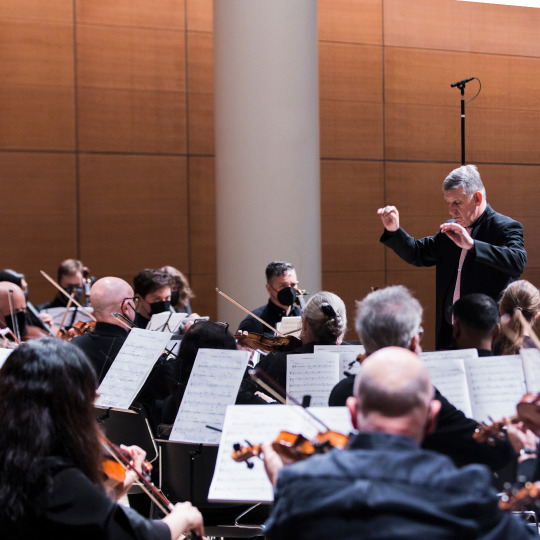
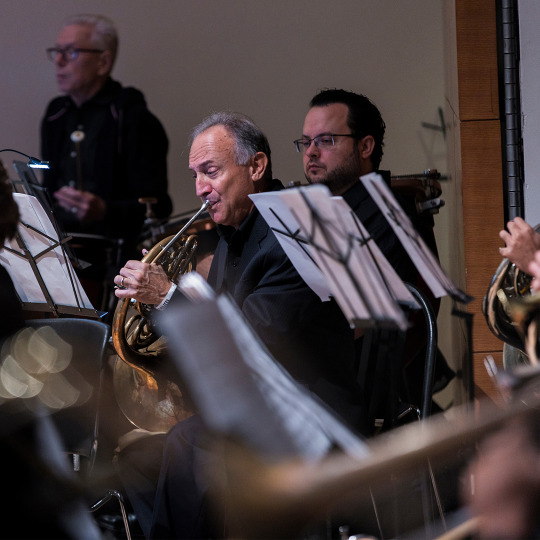
Celebrate aspects of Romanticiscm with a dynamic program from Brooklyn Symphony Orchestra.
On February 26 at 2 pm, the orchestra will take to the auditorium to play for us a powerful program, including:
🎺 Richard Wagner, Prelude to Act I of “Lohengrin” 🎻 Samuel Barber, Souvenirs, op. 28 🎷 Robert Schumann, Symphony no. 4 in D Minor, op. 120
This event is free for ages 16 and younger.
🎟 http://bit.ly/3jRi1Ua
📷 Kolin Mendez
#Brooklyn Museum#brooklyn#museum#art#music#orchestra#brooklyn symphony orchestra#symphony#performance#richard wagner#samuel barber#robert schumann
15 notes
·
View notes
Note
For the music ask game: 16 27 29 30
Hello anonymous! You’ve poked the bear (and by bear I mean washed up and recovered fake child prodigy classical musician turned neurotic adult who can’t even discuss her past in therapy yet) with question 16 (favorite classical piece) but I will indulge cause tumblr is where you let your freak flag fly.
16- fave piece to play w/ a symphony: Schumann a minor piano concerto (at my peak I could play this at a moment’s notice), fave piece to play solo: Chopin 24 preludes (this was the second half of my senior recital in college), fave chamber music piece to play (Brahms piano quartet no. 4 in g minor and your girl got to do this with members from a kinda big deal quartet), fave symphonic piece - Beethoven’s 7th.
27 - song that breaks your heart: Chris Cornell “you never knew my mind” (a song he wrote on a Johnny Cash poem)
29 - song reminiscent of childhood - Beatles’ Michelle (rubber soul album) - my parents are Beatles fans and this was their first vinyl album they bought when they immigrated to the states
30 - song that reminds you of yourself - either Beyoncé’s Cozy or Taylor swift’s The Man (I listen to both really to hype myself up before an anticipated tough day cause I work in a male-dominated field)
3 notes
·
View notes
Text
Schumann - Symphony No. 4 in D minor, Op. 120 (Ct.rc.: Leonard Bernstein...
youtube
Hoy, R. Schumann y su Sinfonía nº 4...🍀🎶💕🌻🌹
4 notes
·
View notes
Text
A new collection of records I got recently from the thrift store
(and their respective song lists, if they have them):
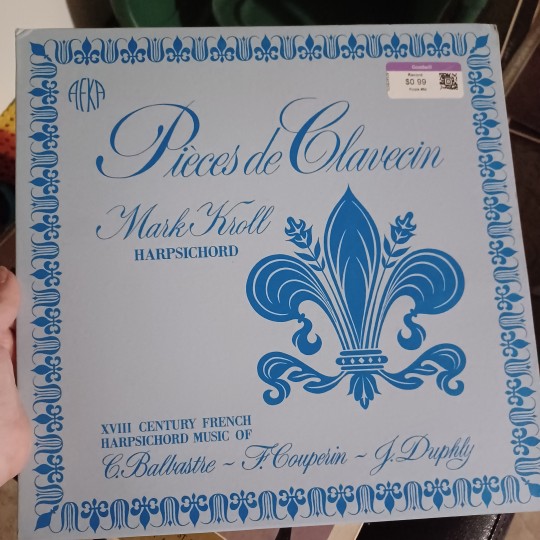
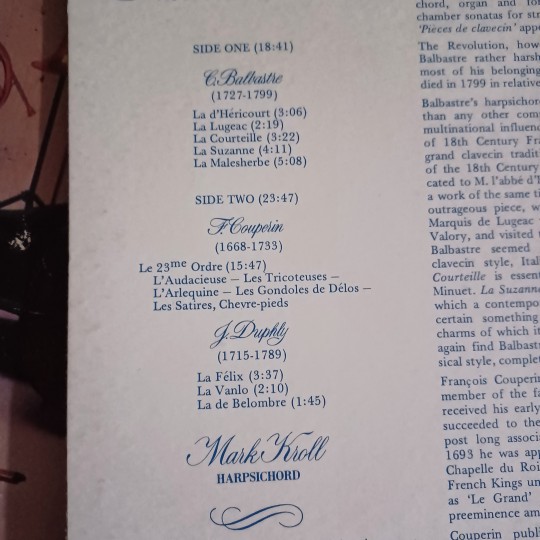
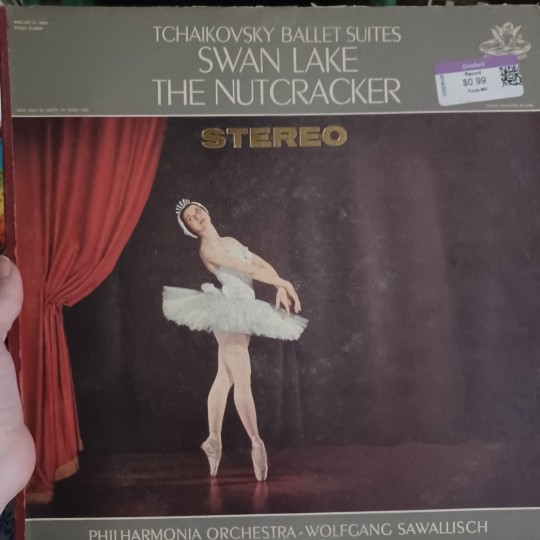

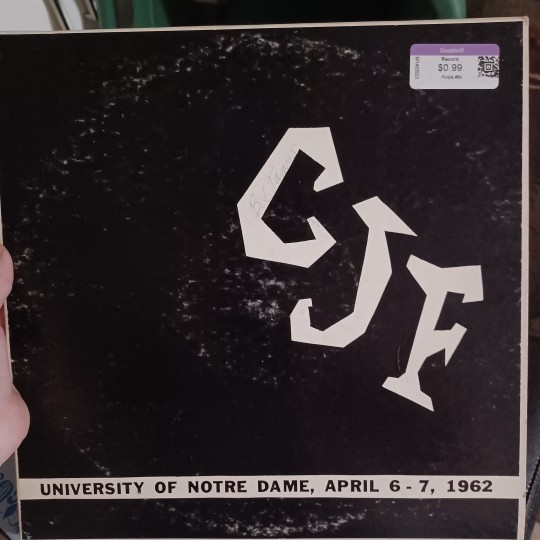

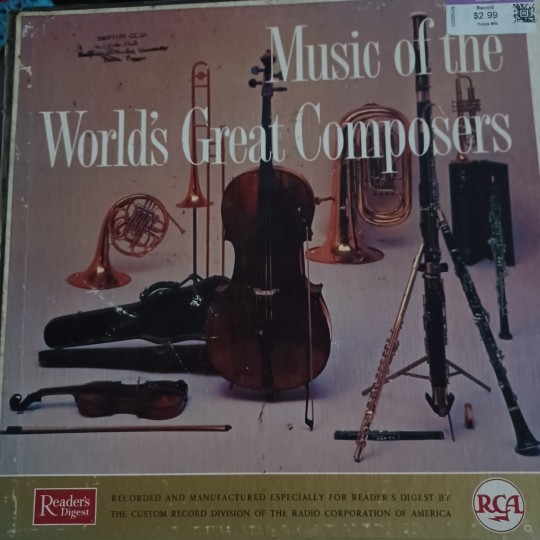
"Music of the World's Greatest Composers" is a collection of 12 records containing songs from the following composers:
Bach Brandenburg Concerto No.1
Handel Water Music Suite
Haydn Symphony No.94 ("Surprise")
Mozart Symphony No.40
Beethoven Symphony No.3 ("Eroica")
Rossini The Barber of Seville: Overture
Schubert Symphony No.8 ("Unfinished")
Berloiz Roman Carnival Overture
Mendelssohn Symphony No.4 ("Italian")
Chopin Les Sylphides - Excerpts
Schumann Symphony No.3 ("Rhenish")
Liszt Mephisto Waltz
Wagner Tristan and Isolde: Prelude and Liebestod
Verdi La Forza del Destino: Overture
Franck Symphony in D Minor
Johann Strauss, Jr. Waltzes: Wiener Blut and Fledermaus: Du und Du
Brahms Symphony No.3
Brizet Carmen: Prelude to Act 1
Tchaikovsky Symphony No.6 ("Pathétique")
Dvořák Carnival Overture
Grieg Peer Gynt Suite No.1
Rimsky-Korsakov Russian Easter Overture
Debussy Prelude to the Afternoon of a Fawn
Richard Strauss Till Eulenspiegel's Merry Pranks
Sibelius Finlandia and The Swan of Tuonela
Stravinsky The Rite of Spring
#im just enamored with them so i wanted to share#ive been sitting and listening to them all for the past 2-3 hours or so#still not even halfway through the 'Music of the Worlds Greatest Composers' yet. only on Side 2 of the first record
5 notes
·
View notes
Text
youtube
Emil Nikolaus von Reznicek (1860-1945) - Symphony No. 4 in F Minor: II. Trauermarsch auf den Tod eines Komödianten
Orchestra: Robert-Schumann-Philharmonie Conductor: Frank Beermann
2 notes
·
View notes
Text
Man I was waiting for this post to make the round. Some more well known pieces.
Unknown Composer
Greensleeves
Johann Sebastian Bach
Air Prelude in C-major Suite No.1 For Cello Badinerie
Georg Friedrich Handel
Halleluja Sarabande in d-minor
Antonio Vivaldi
Summer 3rd mov. Winter 1st mov.
Wolfgang Amadeus Mozart
Symphony 40 1st mov. Piano Concerto 21 Andante Pioano Sonata in C-Major Queen of the Night Figaro Ouverture Requiem Lacrimosa
Luigi Boccherini Minuetto
Joseph Haydn Cello Concerto 1 in C-Major
Ludwig van Beethoven
Symphony 6 1st mov. Symphony 7 2nd mov. Symphony 9 2nd mov and of course 4th mov. Ode to Joy Moonshine Sonata 3rd mov. Pathetique Sonata 2nd mov. and 3rd mov. Tempest Sonata 3rd mov.
Franz Schubert
Serenade Improptu 4 Op 90 Erlkönig
Hector Berlioz
Symphonie Fantastique - Dream Of A Witches Sabbath
Guiseppe Verdi
Va, Pensiero Aida, Marcia
Giachino Rossini
Ouverture to Barber of Seville
Frederic Chopin
Nocturne 2 Etude Winterwind Etude Tristesse Fanatasy-Improptu Great Walz Brilliante Minute Waltz Waltz in C#-minor Heroic Polonaise Ballade 1 Prelude in E minor
Niccolo Paganini
Caprice No. 24 La Campanella
Vittorio Monti
Czardas
Robert Schumann
Childhood Scenes From Foreign Lands and Poeple and Dreaming Forest Scene Farewell
Felix Mendelssohn
Songs Without Words No. 6
Johannes Brahms
Hungarian Dance Walz in A flat Major
Johann Strauss II Ouverture to Die Fledermaus Radentzky March Tritsch Tratsch Polka
Georges Bizet
Habanera
Franz Liszt
Liebestraum Hungarian Rhapsody No. 2 and No.6 La Campanella Paganini for Piano Etude Un Sospiro
Classical Pieces You've Probably Heard but Might Not Remember the Name
William Tell Overture- Rossini (Most famous part at 8:45, but why not listen to the whole thing?) I’m adding hints, at least to the ones I recognized culturally. This one is “go, horsey, go!”
Also Sprach Zarathustra- Strauss Slow, dramatic entry scene, IN SPAAACE.
Eine Kleine Nachtmusik- Mozart People running out of a fancy wedding or something. Also known as DUN, dun DUN, dun DUN dun DUN dun DUUUUN.
Symphony 94, Mvt. 2 “Surprise Symphony”- Haydn ?
Toccata and Fugue in d Minor-Bach Halloween organ!
Nocturne Op. 9 No. 2- Chopin Picture a tiny old woman playing piano in a sunlit room with lots of flower vases, about the spill the tragic secrets of her past to some timid young visitor.
Rondo alla Turca- Mozart the babysitter from The Incredibles: “Time for some COGNITIVE ENRICHMENT!”
Sinfonie de Fanfares: Rondeau- Jean-Joseph Mouret Royalty is coming. Or someone is getting married. Or royalty is getting married. Also the PBS Masterpieces theme.
The Four Seasons: Spring- Vivaldi (I just linked to the whole thing because it’s great) Again, someone is getting married, but this one is strings instead and a lot less frumpy.
Jesu, Joy of Man’s Desiring- Bach That one that amateur guitarists love where the notes are all up and down but all the same length. Also used in movie weddings.
O Fortuna (from Carmina Burana)- Carl Orff SONG OF DOOM. Also song of “baby on fire!” in The Incredibles.
Funeral March- Chopin ?
Orpheus in the Underworld: Infernal Galop (A.K.A. Can Can)- Offenbach Well, “aka can-can” says it all.
Pomp and Circumstance (You probably graduated to this)- Elgar Oh yes, Baaaa dun dun dun duun duuuuun… Also if you were a bandie you had to play it for 3 years before graduating to it.
Gayane: Sabre Dance- Aram Khachaturian Comically hectic productivity, a circus clown juggling while standing on a ball, or perhaps a rapidly-approaching termite infestation. Could go any way, really.
A Midsummer Night’s Dream: Wedding March- Mendelssohn The song movies play right AFTER they both say “I do.”
Carmen: Les Toreadors- Bizet I can’t be the only one who remembers when ‘Hey Arnold’ did this. “Bullfights and swordfights, rolling in manuuure!”
The Ride of the Valkyries- Wagner Good song for a naval battle I guess? I can only think of the mini golf course I went to as a kid with the creepy castle on Hole 18 that played this.
Für Elise- Beethoven That one every amateur piano player loves to play because the beginning is just E and E-flat over and over. Also ballet and piano recital scenes in movies.
Dance of the Hours- Ponchielli Hello mudda, hello fadda, here I am at, Camp Granada…
Rigotello: La Donna e Mobile- Verdi More than a few sophisticated movie villains (or snobby good guys) have this playing on a Victrola. Also, tell me you don’t picture Pavaroti no matter who’s actually singing.
Night on Bald Mountain- Mussorgsky ?
Romeo and Juliet: Love Theme- Tchaikovsky More movie-love, usually building up to admitting they live each other.
Entry of the Gladiators- Julius Fucik I have one word for you: CIRCUS.
Lakmé: Flower Duet- Delibes OMG ALIAS. Nadia’s spy backstory in Film Noir!
Peer Gynt: In the Hall of the Mountain King- Greig Mischievous Tiptoeing in Movies song. Also something growing out of control, slowly at first and then quickly, and (comically) exploding.
Rodeo: Hoedown- Copland The title says it all tbh.
Peer Gynt: Morning Mood- Greig Sunrise/waking up Movie Song du jour.
New World Symphony Mov. [2][4]- Dvorak Well now I’m thinking of “An American Tail” and I’m crying…
Ave Maria (You knew this, but did you know that it was by Schubert?) Nothing to add. I’m not a music snob, really, but if you didn’t know this, YOU SHOULD.
Canon in D- Pachelbel This is the one that the pretty Trans-Siberian Orchestra Christmas song comes from. :-)
Add others if you want! Have fun!
334K notes
·
View notes
Text
the more i think about it the more i regret not submitting schumann 4 to the symphony bracket. oh well
2 notes
·
View notes
Text
Brahms: 1833-1897
Started playing cello as a young man. Loved Clara Schumann, she and Robert were friends of Brahms.
Clarinet Sonatas 1 and 2
Piano Concerto no. 1 and 2
Horn Trio
Violin concerto
Symphony no. 4 in E minor
Symphony no. 2
Symphony no. 3
Brahms Sonata no 1 in E minor - the main theme of the first movement and third are based on passages from Bach’s unfinished masterpiece, The Art of Fugue.

0 notes
Text
WILLIAM STEIMBERG
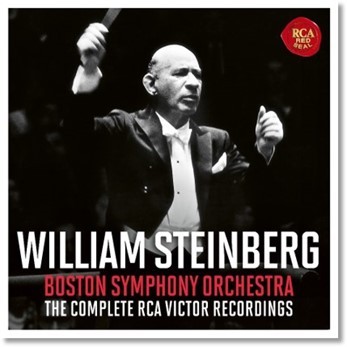
THE COMPLETE RCA VICTOR RECORDINGS
Las grabaciones completas para RCA Victor remasterizadas a partir de las cintas multipista analógicas con 3 grabaciones inéditas Grabaciones para RCA de William Steinberg y la Orquesta Sinfónica de Boston.
William Steinberg alcanzó la cima de su carrera cuando fue nombrado director musical de la Sinfónica de Boston en 1969, como sucesor de Erich Leinsdorf. Ningún director anterior había dirigido simultáneamente dos de las diez mejores orquestas de Estados Unidos. La condición que había puesto para asumir esa posición en Boston era que pudiera seguir trabajando en Pittsburgh con la orquesta que dirigía desde 1952.
Nacido con el nombre de Hans Wilhelm Steinberg en Colonia el 1 de agosto de 1899, estudió en el conservatorio local con el director de orquesta Hermann Abendroth y el pianista Lazzaro Uzielli, alumno de Clara Schumann. Tras licenciarse en 1920, se convirtió en ayudante de Otto Klemperer en la Ópera de Colonia. En 1929 fue nombrado director musical en Fráncfort. Relevado de su cargo por los nazis en 1933, dirigió conciertos en Fráncfort y Berlín bajo el patrocinio de la Liga Cultural Judía antes de emigrar a Palestina en 1936 para hacerse cargo de la Orquesta de Palestina (actual Orquesta Filarmónica de Israel). Invitado por Toscanini, viajó a Estados Unidos en 1938 para colaborar en la formación de la nueva Orquesta Sinfónica de la NBC. En 1945 asumió la dirección musical de la Filarmónica de Búfalo, donde le gustaba referirse a sí mismo como "Búfalo Bill".
Por desgracia, la colaboración de Steinberg/Boston con la RCA fue desafortunada y efímera. No por el repertorio, sino por la caída en picado de las ventas y la espiral de costes que asolaba a la industria discográfica estadounidense en general, lo que convenció a RCA de que su contrato con la Sinfónica de Boston caducara tras 52 años de asociación. Peter Quantrill, de la revista Gramophone, afirmó en 2018 que Steinberg era "el más infragrabado de los grandes directores de orquesta de la segunda mitad del siglo pasado".
En 2004, el crítico Richard Freed escribió sobre la Novena Sinfonía de Schubert (CD 1) y la Sexta Sinfonía de Bruckner (CD 2): "Ambas [son] interpretaciones vitales e inspiradoras, libres de la monumentalización que con demasiada frecuencia se inflige a dicha música: se encuentran entre las mejores aportaciones de su discografía y entre las mejores grabaciones de las obras". Según John L. Holmes en Conductors on Record, también eran las favoritas de Steinberg entre sus propias grabaciones. La orquestación del Scherzo del Octeto del propio Mendelssohn y el Scherzo fantastique y el Scherzo à la russe de Stravinsky, combinados en el CD 3 con formidables interpretaciones virtuosas de piezas orquestales de Dukas, Richard Strauss y Saint-Saëns, se prepararon originalmente para su publicación en el LP LSC-3155, pero permanecían inéditos, hasta ahora.
Este repaso a las grabaciones de la Sinfónica de Boston para la RCA durante la época de Steinberg se completa con grabaciones de 1970 de la Sinfonía del "Nuevo Mundo" de Dvořák y la Obertura de Carnaval (CD 4) de la misma época grabadas por Arthur Fiedler, antiguo violinista de la BSO y director durante muchos años de la Boston Pops. Sus grabaciones de repertorio principalmente ligero para RCA generaron unas ventas totales de más de 50 millones. Sin embargo, su ambición era grabar una gran sinfonía, y aquí RCA le concedió su deseo con retraso, poniendo a su disposición por primera y única vez a la Orquesta Sinfónica de Boston al completo.
Todas las grabaciones del conjunto se han transferido y remasterizado desde las cintas analógicas de 3 pistas (CD 1), 4 pistas (CD 2, 3 [1-6], 4) y 2 pistas (CD 3 [7-9]) utilizando tecnología de 24 bits / 192 kHz.
CONTENIDO DEL SET
DISC 1:
Schubert: Symphony No. 9 in C Major, D.944 "The Great"
DISC 2:
Bruckner: Symphony No. 6 in A Major, WAB 106
DISC 3:
Dukas: The Sorcerer's Apprentice
Strauss, R.: Till Eulenspiegels lustige Streiche Op. 28
Mendelssohn: Octet in E-flat Major, Op. 20, MWV R20: III. Scherzo [first release]
Saint-Saëns: Danse Macabre
Stravinsky: Scherzo fantastique [first release]
Stravinsky: Scherzo à la russe [first release]
Stravinsky: Pétrouchka: Russian Dance (S. Ozawa)
Kodály: Háry János: Viennese Musical Clock, Entrance of the Emperor and his Court (E. Leinsdorf)
DISC 4:
Dvořák: Symphony No. 9 in E Minor, Op. 95 "From the New World" (A. Fiedler)
Dvořák: Carnival Overture (A. Fiedler)
0 notes
Text


TEATRO MUNICIPAL DE SÃO PAULO, 28.01.2024.
ROBERT SCHUMANN- Opening Opera Genoveva (10’)
PIOTR ILYICH TCHAIKOVSKY- Symphony nº 4 (50’).
1 note
·
View note